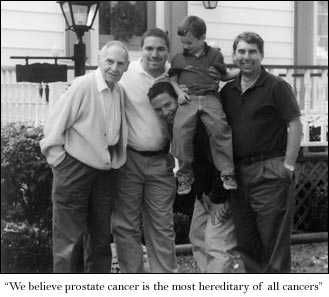Important New Tool in Fight Against Prostate Cancer
Familial Prostate Cancer Screening Program Opens at Northwestern Memorial Hospital
We are enrolling people with a family history of prostate cancer in
research studies that aim to map the genetics of prostate cancer

We have opened a Familial Prostate Cancer Screening Program at Northwestern Memorial Hospital in Chicago to help us zero in on genes that may lead to new screening tests and eventually new strategies to prevent and treat one of the top two cancer killers in men.
We believe prostate cancer is the most hereditary of all cancers. One in six American men is at a lifetime risk of prostate cancer. Heredity may be responsible for as many as a third of the cases of prostate cancer diagnosed before the age of 60 and up to one-half of cases of men diagnosed before age 55.
If we can find out which genes are involved in the development of prostate cancer and then figure out what goes wrong when they are mutated, we can direct our attention to the prevention and possible cure of prostate cancer.
Unlike the successful mapping of BRCA1 and BRCA2, which explain a substantial proportion of hereditary breast cancers, genes conferring susceptibility to prostate cancer have been more elusive.
Were about ten years behind breast cancer. So far, researchers have identified about 40-50 candidate regions of the human genome that need further investigation. I think eventually well end up with about a dozen different genes that, when mutated, can be implicated for prostate cancer susceptibility and/or aggressiveness. And the answers will eventually be found by hitting a bunch of singles, rather than one home run.
The Genetics of Prostate Cancer Study
For More Information about Northwestern’s Familial Prostate Cancer Screening Program
Please call:
Northwestern Memorial Hospital’s
physician referral department at:
312-926-8400
or
1-877-926-4664
or contact:
Theresa Graif
Research Coordinator
Familial Prostate Cancer Screening Clinic
phone (312) 695-0195
Email: tgraif@northwestern.edu
or mail or fax
a letter of interest to:
William J. Catalona, M.D. or Misop Han, M.D.
Co-Directors, Clinical Prostate Cancer Program
Robert H. Lurie Comprehensive Cancer Center
Northwestern University
Feinberg School of Medicine
676 North St. Clair Street
Suite 1200, Room 1254
Chicago, Illinois 60611-2927
Fax (312) 695-1144
Our program will enroll men with a family history of prostate cancer and men with other possible genetic predispositions, including a relative with breast cancer, and provide them with state-of-the-art clinical testing. Researchers will then compile resulting genetic transcripts into a database that may help identify the genes responsible for prostate cancer.
Misop Han, M.D., is the co-director of the Familial Prostate Cancer Screening Program at Northwestern Memorial and assistant professor of urology at Northwestern Universitys Feinberg School of Medicine. The primary focus of his research has been the outcome of prostate cancer treatment. As in my practice, he also specializes in nerve-sparing radical prostatectomy for clinically localized prostate cancer. Dr. Han will play an integral role in the program in screening and treating men with a family history of prostate cancer.
Because of our research center, men at high risk for prostate cancer will have access to state of the art diagnostics and innovative research.
Northwesterns program will be one of the first places to offer the pro-PSA test. PSA has many forms, including Pro-PSA, which may be a better marker than free or complexed PSA for distinguishing between PSA elevations due to prostate cancer and those due to benign conditions of the prostate.
In addition, a state-of-the-art color Doppler ultrasound machine will be used for prostate imaging and biopsy. Recent evidence suggests that this machine may be more accurate in the detection of prostate cancer than the black and white ultrasounds currently in use at most facilities.
The color Doppler illustrates in red where there is increased blood flow, and areas with a lot of blood vessels are more likely to be sites for cancer.
The genetics revolution will change the way prostate cancer is diagnosed and treated. We don’t have practical applications for prostate cancer yet, but we’re very close. At the rate new discoveries are coming from the genetics revolution and with our progress in putting together the missing pieces of the prostate cancer puzzle, things could happen quickly enough to benefit current patients.







